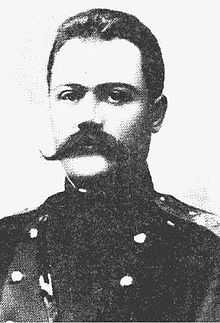Abkhazi

Abkhazi (Georgian: აფხაზი; also known as Abkhazishvili) was a princely family in Georgia, a branch of the Shervashidze family from Abkhazia.
According to the genealogical treatise by Prince Ioann of Georgia (1768-1830), the ancestors of the family fled the Islamicization of Abkhazia to the eastern Georgian kingdom of Kakheti were they were elevated, in 1636, to the princely dignity and enfeoffed by the king Teimuraz I with the estate at Kardenakhi, which had hitherto been in possession of the extinct line of the Vachnadze family.[1]
After the Russian annexation of the Kingdom of Georgia, the family (Russian: Абхази, Абхазовы) was integrated into Russian princely nobility in 1826.[2]
In the wake of the Russian Revolution of 1917, Prince Konstantine Abkhazi, the head of the house, presided over the decision of the Assembly of Georgian Nobility to declare their property national. He then led an anti-Soviet opposition group, and was executed by the Bolsheviks in 1923.[3]
Prince Nicholas Abkhazi (died 1987) and his Shanghai-born wife Peggy Pemberton Carter (died 1994) moved to Canada and, beginning from 1946, built the well-known "Abkhazi Gardens" in the city of Victoria, British Columbia on Vancouver Island.[4]
See also
References
- ↑ Bagrationi, Ioane (1768-1830). Abkhazishvili (Princes of Kakheti). The Brief Description of the Georgian Noble Houses. Retrieved on November 27, 2007.
- ↑ Toumanoff, Cyril (1963), Studies in Christian Caucasian History, p. 269. Georgetown University Press.
- ↑ Lang, David Marshall (1962), A Modern History of Georgia, p. 241. London: Weidenfeld and Nicolson.
- ↑ Abkhazi Garden. The Land Conservancy of British Columbia. Retrieved on November 28, 2007.